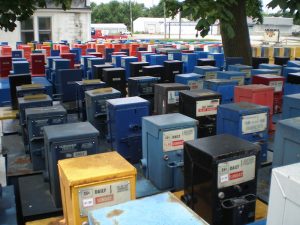This is an area where too many of the deer and antelope play, where wild turkeys travel in sullen gangs, and official cautions about bears are not just an academic exercise.
We were at a party a few weeks ago when I happened to pick up a fragment of the conversation just in time to hear a visitor from North Carolina offer the opinion that “the only good thing about New Jersey is Bruce Springsteen.” She was sorry she couldn’t get a ticket to see his show in New York. The nearby host demurred and said something to the effect that “we love him, but there’s more to the state than Bruce.” I wish I’d been fast enough to have thrown in a little Jersey attitude as well, perhaps the coda: “and we’re prepared to break the legs of anyone who disagrees.”
The comment was a red flag. It seems rude for a party guest to be critical of the host’s state. That’s the job of people who live in it, and we do it well. It was even more ironic that this was said in a beautiful New Jersey home on it’s “west coast,” near the Delaware River. The house sits in the kinds of woodlands that cover over 40 percent of the Garden State. It’s next to conservation district filled with trees and pastures, and across from a trout stream. Locals swear that Vermont tourism officials once came to this spot to take pictures of “their” countryside. It’s also an area where too many of the deer and antelope play, where wild turkeys travel in sullen gangs, and official cautions about bears are not just an academic exercise. Lovely villages hug the shores of the East’s most impressive “wild and scenic river,” the Middle and Upper portions of the Delaware. Both sides of its wooded banks as scattered with historic inns, including one in Stockton memorialized in the Rogers and Hart standard, “There’s a Small Hotel.”
I won’t run down the list of backward ideas that seem to catch the fancy of many in the Tar Heel State. I will just say that from a Garden State perspective, some of our friends to the south still seem to still be fighting old culture wars, to the detriment of women, gay Americans and Muslims.
Residents here tend to be more forward-looking. People in New Jersey actually vote to increase their taxes to preserve farms and open space. The corollary is the right to complain about the higher cost of living. And other supposed bargain states might take note: New Jersey is near the top in the performance of its tax-funded public schools, average household income, residents with advanced degrees, sane gun laws, and standards for the treatment of animals.
As befits a state that still believes in communities and their governments, the geographically compact state has over 500 of municipal bodies . All these big and little school districts, towns and boroughs are expensive to support. But they suggest that many residents are engaged. Live in a small town, and you will be asked to serve a stint on the Planning Board or Shade Tree Commission. Even the state’s bigger cities on it’s east coast seem to be on a roll of newfound civic activism.
I’ve lived in California, Colorado, Great Britain and Pennsylvania, and liked them all. But New Jersey seems to be the most open to ethnic and religious differences. In a recent flight from Florida to Trenton I was proud of the overcrowded plane with the diversity of a United Nations gathering.
So a word of warning: Please don’t use the Garden State as the national piñata. There is so much more to New Jersey than the Turnpike and Newark/Liberty Airport. And to our friends from the south, be sure there are human assets to claim for your state beyond notable landmarks like the grand Biltmore Estate, the nation’s largest private home. Anyway it’s just possible that one day Bruce may buy the place and move it to Rumson.


